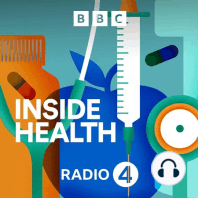28 min listen
Dementia advice, Antidepressants, Transplant organs, Vaginal seeding
FromInside Health
ratings:
Length:
29 minutes
Released:
Mar 8, 2016
Format:
Podcast episode
Description
Millions of anti-depressants are prescribed every year and more than half of people taking them have been doing so for two years or more. But how do you know when you're better and how can you tell that the time is right to stop taking them? Withdrawal symptoms are often confused with a return of the original depression so careful tapering of medication is crucial. Tony Kendrick, Professor of Primary Care at the University of Southampton gives Dr Mark Porter a run down of what to do, and what not to do, when it comes to coming off medication.
If you're 40 or above you're to receive dementia awareness as part of the latest Prime Minister's Challenge on Dementia 2020, just announced. The plans to include dementia education for middle aged people in future NHS Health Checks are aimed at making England - no plans as yet to replicate this in Scotland, Wales or Northern Ireland - the best country in the world for dementia care.
Dr Margaret McCartney reviews the new proposals.
Seven thousand people in the UK are currently waiting for life saving organ transplants - and every year 1200 die because there's a critical shortage of donor organs. It's meant that the transplant community has had to consider using organs that aren't quite as perfect as they would like. Poorer quality, older or damaged organs are now being considered when they would have been rejected in the past. Mark visits Rutger Ploeg, Professor of Transplant Biology at the University of Oxford at the Oxford Transplant Centre to find out about the pioneering work to treat, heal and re-condition organs using normothermic perfusion devices - essentially mini-life support machines that work at body temperature.
Frederique Rattue was the first woman at her local hospital to use "vaginal seeding" when her fourth child was born by caesarean section a year ago. It's a practice that involves taking a swab from the mother's vagina and rubbing it over the baby's mouth, face and skin after birth and the theory is that vaginal seeding will restore the microbiota of infants born by caesarean section, boosting their gut bacteria and reducing the risk of allergies or obesity. Dr Margaret McCartney discusses the theory of vaginal seeding and the evidence that the practice leads to health benefits for the baby.
If you're 40 or above you're to receive dementia awareness as part of the latest Prime Minister's Challenge on Dementia 2020, just announced. The plans to include dementia education for middle aged people in future NHS Health Checks are aimed at making England - no plans as yet to replicate this in Scotland, Wales or Northern Ireland - the best country in the world for dementia care.
Dr Margaret McCartney reviews the new proposals.
Seven thousand people in the UK are currently waiting for life saving organ transplants - and every year 1200 die because there's a critical shortage of donor organs. It's meant that the transplant community has had to consider using organs that aren't quite as perfect as they would like. Poorer quality, older or damaged organs are now being considered when they would have been rejected in the past. Mark visits Rutger Ploeg, Professor of Transplant Biology at the University of Oxford at the Oxford Transplant Centre to find out about the pioneering work to treat, heal and re-condition organs using normothermic perfusion devices - essentially mini-life support machines that work at body temperature.
Frederique Rattue was the first woman at her local hospital to use "vaginal seeding" when her fourth child was born by caesarean section a year ago. It's a practice that involves taking a swab from the mother's vagina and rubbing it over the baby's mouth, face and skin after birth and the theory is that vaginal seeding will restore the microbiota of infants born by caesarean section, boosting their gut bacteria and reducing the risk of allergies or obesity. Dr Margaret McCartney discusses the theory of vaginal seeding and the evidence that the practice leads to health benefits for the baby.
Released:
Mar 8, 2016
Format:
Podcast episode
Titles in the series (100)
'SARS-like' virus, reflux heartburn, corrective baby helmets: Dr Mark Porter asks whether headlines identifying a 'SARS-like' virus may cause panic. by Inside Health
